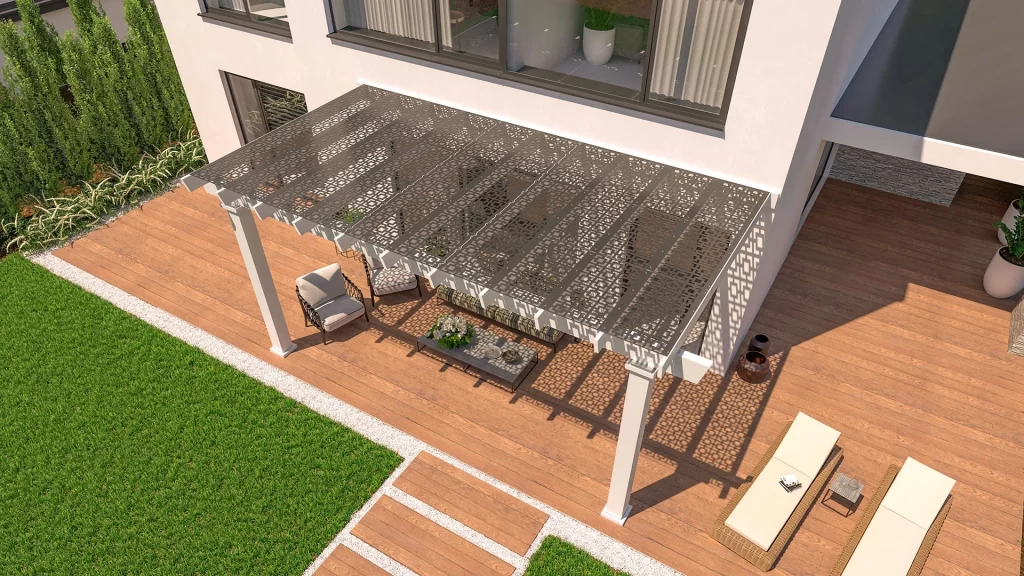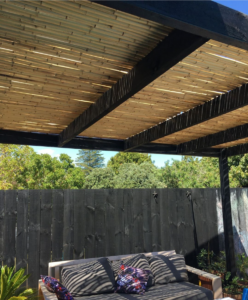Shade panels play a crucial role in creating comfortable outdoor spaces, shielding us from the sun’s harsh rays while adding aesthetic appeal to our surroundings. Traditionally, shade panels have been crafted from materials such as wood or plastic. But, as sustainability becomes an increasingly important consideration, designers are turning to modern and eco-friendly alternatives to meet their shading needs.
In this post, we’ll delve into some of these innovative materials, exploring their benefits and assessing their sustainability.
The Shift Towards Sustainability
With climate change and environmental degradation at the forefront of global concerns, the construction industry must adopt more sustainable practices to create systems that work for us, our clients, and the environment. With a growing emphasis on reducing carbon footprints and minimizing waste, materials are essential in our industry. Shade panels, which are often subjected to significant wear and tear, are no exception.
Not All Materials Are The Same
Luckily, today, there are plenty of options for sustainable building materials. Many materials are incredibly eco-friendly, but only a few are suitable for shade panels. Some of the most sustainable materials are:
-
- Stone: Stone is a naturally occurring material that is plentiful. Its high durability and low maintenance make it a versatile material that produces minimal waste. Although highly recyclable, the stone is not a great option for shade panels due to its weight, among other issues.

-
- Wood: Wood is one of the most popular materials due to its natural look and feel. New reclamation technology allows us to deconstruct wooden structures while preserving the materials’ structural integrity. It’s a genuinely effective step in reducing deforestation. That said, wood is a tough material to maintain and can degrade quickly.

-
- Plastic: With technological advancements, we can now recycle plastic into building materials such as sheets, lumber, and brick. Recycled plastic materials reduce the already massive amount of plastic polluting waterways and landfills. But, microplastics are still a concern, and a long time spent in the heat and sunlight risks damaging plastic materials.

Aluminum: The Modern, Sustainable Shade Solution
I’m sure you’ve noticed that aluminum hasn’t been mentioned yet. There is a good reason for that: aluminum is your best option among sustainable materials. Among the modern materials used for shade panels, aluminum stands out as a versatile and sustainable option. While often associated with industrial applications, aluminum has emerged as the go-to material in many projects.

Aluminum is lightweight yet incredibly durable, making it ideal for outdoor structures that require strength and resilience. Its natural corrosion resistance ensures longevity, reducing the need for frequent replacements and costly maintenance. Additionally, aluminum is fully recyclable, meaning it can be repurposed into new products at the end of its life cycle, contributing to a closed-loop system.
The Benefits of Aluminum
The sustainability of aluminum is fantastic, but that matters very little if the utility and aesthetics of aluminum are poor. Thankfully, not only is aluminum sustainable, but it is an excellent overall choice for shade panels.
Durability
One of the primary advantages of aluminum shade panels is their exceptional durability. Unlike other materials, such as wood or fabric, which deteriorate over time, aluminum maintains its structural integrity for a lifetime. This longevity ensures a lasting investment that minimizes waste and conserves resources.
Versatile Design
Aluminum shade panels are incredibly versatile in design. Aluminum can be easily customized to meet the unique needs of any project, allowing shading solutions that seamlessly integrate with the style of the structure. Whether it is a perforated pattern for a decorative effect or a pattern that will enable optimal shading, aluminum offers endless possibilities.
A Recyclable Build Material
Most importantly, aluminum boasts impressive sustainable credentials. Aluminum is fully recyclable, meaning someone can recycle it indefinitely without losing its incredible durability; a piece of aluminum recycled 50 times is just as strong as a brand-new piece. This closed-loop recycling process significantly reduces the environmental impact of aluminum production, making it an eco-friendly choice. Using recycled aluminum is also much more energy efficient, requiring 95% less energy to produce than from raw materials.
The Correct Choice For You
The shift towards sustainable design practices drives innovation in shade panels, with modern materials like aluminum leading the way. With its durability, versatility, and eco-friendly attributes, aluminum offers the best solution for balancing functionality, aesthetics, and environmental responsibility.
By embracing sustainable materials like aluminum, we can create outdoor spaces that provide shelter and shade and contribute to a more sustainable future for future generations.
